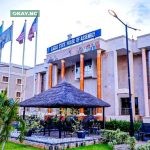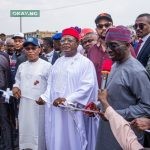On Monday, February 17, 2025, Osun State experienced significant unrest as members of the All Progressives Congress (APC) and the Peoples Democratic Party (PDP) clashed over control of local government council secretariats. The confrontations, marked by sporadic gunfire and the presence of hooded gunmen, have heightened tensions across the state.
The root of the conflict lies in a recent Court of Appeal judgment that reinstated previously sacked elected council chairmen and councillors affiliated with the APC. The APC interpreted this ruling as a mandate to reclaim control of the local councils. Conversely, the Osun State Government, led by the PDP, contends that a prior Federal High Court decision in Osogbo had nullified the elections that brought these officials to power, rendering the appellate court’s decision ineffective.
In the early hours of Monday, APC members mobilized to take over various council secretariats. Their efforts were met with resistance from armed individuals, leading to violent confrontations. In Boluwaduro Local Government Area, for instance, hooded gunmen thwarted the APC’s attempt to assume control. Similarly, in Olorunda Local Government Area, both APC and PDP members were prevented by police forces from accessing the council secretariat, underscoring the volatile nature of the standoff.
Eyewitnesses reported alarming scenes in Irewole Local Government Area, particularly in Ikire. Tunde Shamsudeen, a traveler on the Ikire-Ibadan expressway, recounted: “Hooded gunmen were shooting sporadically into the air in front of the council secretariat in Irewole, Ikire, which is right on the express road.” This display of force caused motorists to divert their routes at Ikoyi to avoid potential danger.
Despite the chaos, the APC managed to gain access to certain council secretariats. However, the effectiveness of these takeovers remains questionable, as many government workers adhered to a directive from the Nigeria Labour Congress (NLC) in Osun State to stay away from their offices, leading to deserted secretariats.
The political landscape in Osun has been fraught with tension since the 2022 gubernatorial election, where the PDP’s Ademola Adeleke emerged victorious over the incumbent APC governor, Adegboyega Oyetola. This power shift intensified disputes over local governance, especially concerning the legitimacy of council officials elected during the APC’s tenure.
Governor Adeleke has accused his predecessor, Oyetola, who currently serves as the Minister of Marine and Blue Economy, of orchestrating unrest in the state. In a press conference held on Sunday, Adeleke alleged that Oyetola was attempting to enforce an unlawful reinstatement of sacked local government chairmen, a move he believes is designed to destabilize the current administration. Adeleke called on President Bola Tinubu to intervene, warning that such actions could escalate into widespread violence.
In response, the APC maintains that the Court of Appeal’s ruling justifies their actions to reclaim local government positions. They argue that the judgment effectively overturns the previous nullification and reinstates their officials’ mandates. This legal tug-of-war has left local councils in a state of uncertainty, with both parties laying claim to authority.
The situation has also had a profound impact on the daily lives of Osun residents. The clashes have led to disruptions in public services, as many local government offices remain closed due to safety concerns. The presence of armed groups and the sporadic gunfire have instilled fear among the populace, leading to decreased economic activities and mobility within the state.
Security agencies have been deployed to various hotspots to prevent further escalation. The Osun State Police Command has urged residents to remain calm and avoid areas prone to clashes. They have also called on political leaders from both parties to engage in dialogue and seek peaceful resolutions to the disputes.









